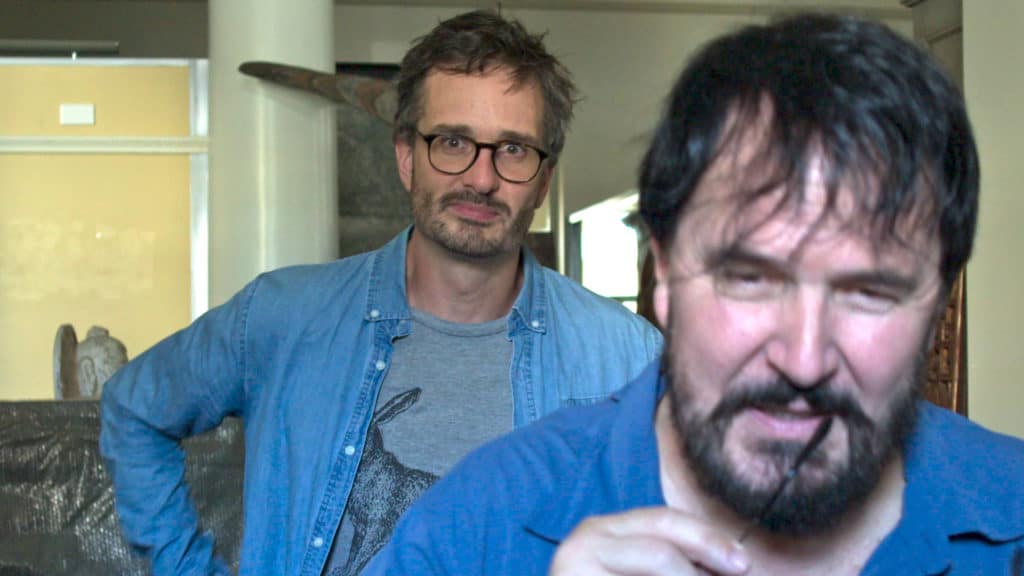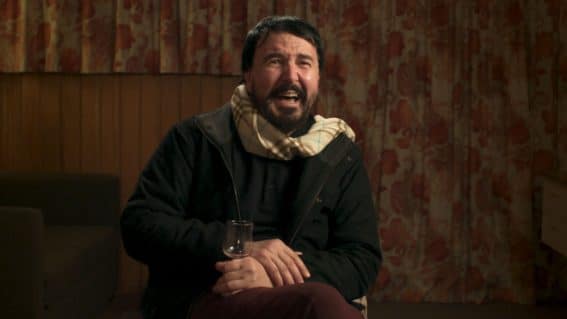
We seem to be living through something of a golden age for documentary film. With the rise and rise of Netflix and other platforms, there now seems to be endless scope to provide for people’s endless appetite for them, to queue them up; they don’t necessarily only want to see great, momentous events being explored, either. Anything odd will do. Well, Mister Organ (2022) is certainly not about momentous events. It’s focused on the individual of the title, one Michael Organ, a fairly unremarkable person in many respects, save for his propensity to deceive and manipulate. As such, this character study steers away from grand revelations and truths; it chooses a different approach altogether. Nonetheless, filmmaker David Farrier still manages to weave a reasonably diverting yarn here, albeit with a few issues and omissions.
The film is often busy with New Zealanders who have, at some point in their lives, encountered Mister Organ; we start with Farrier driving out to meet one of them at a remote ex-psychiatric hospital, now partitioned off into private apartments. Farrier says that this is an appropriate enough place to begin, given that he feels – at this point – like he’s in need of its former function. But that’s left hanging for now: back to 2016 we go, before all of this started.
As an investigative journalist, Farrier picked up on an interesting local story back then, where the proprietor of one Bashford’s Antiques, a Jillian Bashford, became embroiled in a fight with residents parking outside her shop after hours. She hired a wheel clamper – legal, on her private property – who began enforcing her rights to a very lucrative degree, charging hundreds of dollars for the removal of the clamps. The person in charge of the clamping? Michael Organ, who on even brief investigation proved to be a rather colourful character. When the story hit the press, legal letters started to fly, letters which claimed to stem from a practicing lawyer – also Mr. Organ. Clearly there was something odd going on, which proved irresistible for Farrier.
Farrier could, at this point, have begun systematically dismantling Organ’s claims. After all, it’s straightforward enough to find out who does and doesn’t have a qualification enabling them to practice law; detecting IP addresses would have provided some useful indication of whether or not someone was, as claimed, impersonating Organ when it came to the legal letters. That isn’t the film we get, though. In lieu of that, Farrier talks to a number of individuals who have known Organ in the past. Some of them lived with him; all of these rather damaged-seeming individuals willing to talk on camera paint a picture of a manipulative man who gets what he wants by essentially weaponising sheer tedium, talking them into submission and laying them low. This is an interesting phenomenon, as much as it invokes a tale of a fairly recognisable, standard-issue narcissist with some less usual add-ons (such as the delusions of nobility), a man who feeds off those less than able to withstand the onslaught. For all that, this material is all hearsay, which could have landed more effectively with some more substantiation. Some of the interviewees are a little problematic in their own right, too: one-time terrorist suspect Jamie Lockett is probably virtually unknown outside of NZ, and to be honest, came across as if this film could easily have been about him; what on earth karate move uses hair pulling to render one’s opponent a ‘zombie’? Flawed witnesses do not a compelling story tell, even if they tantalise at one.
There’s also a sense that Michael Organ himself – who has allegedly lived under a whole host of minor variants on that name – isn’t quite the terrifying, calculating monster that the film occasionally hints he is. He, and by extension the film, have intriguing content (though again, this gets accepted on its own terms rather than really investigated – the key thing, for example). But really what we have here is a man who has apparently filibustered his way through life, with intimidation being his real weapon of choice. As much as this is reprehensible, it’s only since picking up with Jillian Bashford that this seems to have granted him a materially comfortable life. Before that, we get a sense of a chain of failed shared living arrangements, of invented life stories to stand in for the truth, and a handful of hapless criminal acts. He’s a handy litigator, but other than that, Organ seems to have drifted around on life’s fringes, only really able to lord it over people with even less than he had. Establishing all of this makes for a quite loose documentary, not really driving at anything; the big questions, such as those relating to Organ’s family, stay unanswered. This can be frustrating.
Still, as much as the credits roll before all of the answers are forthcoming, Farrier is able to engender interest in this character, and in how his personal story began to overlap with his subject’s. He clearly is impacted by Organ’s behaviour, and responds on a personal level accordingly. The film is a curio as much as anything else, and beyond that, it hints at the debate about what’s best to do with a person like Organ; should their version of events be brought out to die in sunlight, or does providing that attention only entrench their levels of self-belief? Mister Organ feels like an adjunct to the real story which is still out there, but it has its moments.
Mister Organ (2022) screened as part of the Boston Underground Film Festival 2023.
